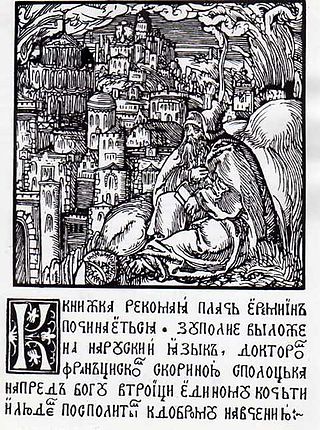
The Book of Lamentations is a collection of poetic laments for the destruction of Jerusalem in 586 BCE. In the Hebrew Bible, it appears in the Ketuvim ("Writings") as one of the Five Megillot alongside the Song of Songs, Book of Ruth, Ecclesiastes, and the Book of Esther. In the Christian Old Testament, it follows the Book of Jeremiah as the prophet Jeremiah is traditionally understood to have been its author.

The Massacreof the Innocents is a biblical story, while mainstream Bible scholars consider it a myth, recounted in the Nativity narrative of the Gospel of Matthew (2:16–18) in which Herod the Great, king of Judea, orders the execution of all male children who are two years old and under in the vicinity of Bethlehem. Some Christians venerate the Holy Innocents as the first Christian martyrs, but modern scholarship finds no evidence that it happened outside the passages in Matthew.

Jeremiah, also called Jeremias or the "weeping prophet", was one of the major prophets of the Hebrew Bible. According to Jewish tradition, Jeremiah authored the book that bears his name, the Books of Kings and the Book of Lamentations, with the assistance and under the editorship of Baruch ben Neriah, his scribe and disciple.

Tisha B'Av is an annual fast day in Judaism. A commemoration of a number of disasters in Jewish history, primarily the destruction of both Solomon's Temple by the Neo-Babylonian Empire and the Second Temple by the Roman Empire in Jerusalem.
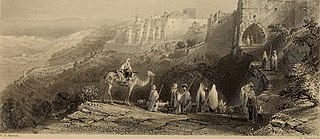
Matthew 2:6 is the sixth verse of the second chapter of the Gospel of Matthew in the New Testament. The magi have informed King Herod that they had seen portents showing the birth of the King of the Jews. Herod has asked the leading Jewish religious figures about how to find out where Jesus was to be born. In this verse they tell him by quoting from the Book of Micah.
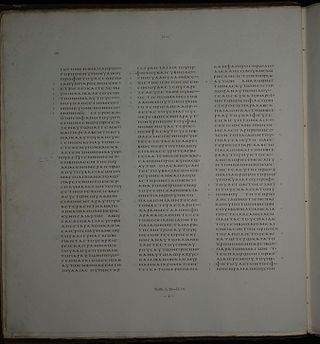
Matthew 2 is the second chapter of the Gospel of Matthew in the New Testament. It describes the events after the birth of Jesus, the visit of the magi and the attempt by King Herod to kill the infant messiah, Joseph and his family's flight into Egypt, and their later return to live in Israel, settling in Nazareth.

Luke 19 is the nineteenth chapter of the Gospel of Luke in the New Testament of the Christian Bible. It records Jesus' arrival in Jericho and his meeting with Zacchaeus, the parable of the minas and Jesus' arrival in Jerusalem. The book containing this chapter is anonymous, but early Christian tradition uniformly affirmed that Luke the Evangelist composed this Gospel as well as the Acts of the Apostles.
The books of the New Testament frequently cite Jewish scripture to support the claim of the Early Christians that Jesus was the promised Jewish Messiah. Scholars have observed that few of these citations are actual predictions in context; the majority of these quotations and references are taken from the prophetic Book of Isaiah, but they range over the entire corpus of Jewish writings.
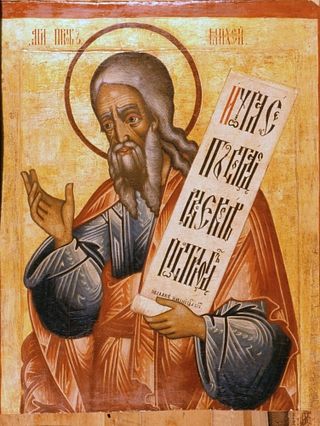
According to the Hebrew Bible, Micah, also known as Micheas, was a prophet in Judaism and is the author of the Book of Micah. He is considered one of the Twelve Minor Prophets of the Hebrew Bible and was a contemporary of the prophets Isaiah, Amos and Hosea. Micah was from Moresheth-Gath, in southwest Judah. He prophesied during the reigns of kings Jotham, Ahaz, and Hezekiah of Judah.
Ramah was, according to the Hebrew Bible, a city in ancient Israel in the land allocated to the tribe of Benjamin. It was located near Gibeon and Mizpah to the West, Gibeah to the South, and Geba to the East.

The Ordo Rachelis, Interfectio Puerorum, or Ludus Innocentium is a medieval dramatic tradition consisting in four plays and based on the Massacre of the Innocents, an event recorded in the Gospel of Matthew, and on the prophecy recorded in the Book of Jeremiah: "A voice was heard in Ramah, lamentation, and bitter weeping; Rahel weeping for her children refused to be comforted for her children, because they were not". The prophecy, which Matthew believed to be fulfilled when Herod the Great ordered the slaughter of all boys under two in Bethlehem, looks backwards to Rachel, the matriarch of the Hebrews, and towards her lamentation over the death of her children, the Hebrew children, in the massacre.
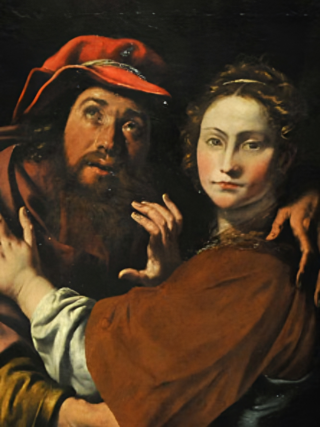
Rachel was a Biblical figure, the favorite of Jacob's two wives, and the mother of Joseph and Benjamin, two of the twelve progenitors of the tribes of Israel. Rachel's father was Laban. Her older sister was Leah, Jacob's first wife. Her aunt Rebecca was Jacob's mother.
Vox in Rama is a decretal sent by Pope Gregory IX in June 1233 condemning the heresy of Luciferianism said to be rife in Germany, and authorizing the preaching of a crusade against it. Copies of the letter were sent to Emperor Frederick II, King Henry (VII) of Germany, Archbishop Siegfried III of Mainz, his suffragans, Bishop Conrad II of Hildesheim and the preacher Konrad von Marburg. The copies are dated to 11, 13 and 14 June.
Matthew 27:9-10 are the ninth and tenth verses of the twenty-seventh chapter of the Gospel of Matthew in the New Testament. These verses end the final story of Judas Iscariot, with a quotation from scripture showing how the events around his final days were predicted.

Jeremiah 6 is the sixth chapter of the Book of Jeremiah in the Hebrew Bible or the Old Testament of the Christian Bible. This book contains prophecies attributed to the prophet Jeremiah, and is one of the Books of the Prophets. Chapters 2 to 6 contain the earliest preaching of Jeremiah on the apostasy of Israel. This chapter relates Jeremiah's warning of "impending destruction from the North".

Jeremiah 7 is the seventh chapter of the Book of Jeremiah in the Hebrew Bible or the Old Testament of the Christian Bible. This book contains prophecies attributed to the prophet Jeremiah, and is one of the Books of the Prophets. Chapters 7 to 10 constitute an address delivered by Jeremiah at the gate of the Temple in Jerusalem.

Jeremiah 39 is the thirty-ninth chapter of the Book of Jeremiah in the Hebrew Bible or the Old Testament of the Christian Bible. It is numbered as Jeremiah 46 in the Septuagint. This book contains prophecies attributed to the prophet Jeremiah, and is one of the Books of the Prophets. This chapter is part of a narrative section consisting of chapters 37 to 44. Chapter 39 records the fall of Jerusalem, verses 1–10, and Jeremiah's fate, verses 11–18.

Ezekiel 19 is the nineteenth chapter of the Book of Ezekiel in the Hebrew Bible or the Old Testament of the Christian Bible. This book contains the prophecies attributed to the prophet/priest Ezekiel, and is one of the Books of the Prophets. This chapter contains a kinah or lamentation for the rulers of Israel. Two princes are lamented, one captured and carried to Egypt, i.e. Jehoahaz, son and successor of Josiah, and another carried to Babylon, who must be Jehoiachin.

Jeremiah 31 is the thirty-first chapter of the Book of Jeremiah in the Hebrew Bible or the Old Testament of the Christian Bible. It is numbered as Jeremiah 38 in the Septuagint. The book contains prophecies attributed to the prophet Jeremiah, and is one of the Books of the Prophets (Nevi'im). This chapter is notable for the passage about the "New Covenant" of God with His restored people and the quoting of 31:15 in the “Massacre of the Innocents" narrative. The Jerusalem Bible refers to chapters 30 and 31 as "the Book of Consolation", and Lutheran theologian Ernst Hengstenberg calls these two chapters "the triumphal hymn of Israel’s salvation".

Jeremiah 40 is the fortieth chapter of the Book of Jeremiah in the Hebrew Bible or the Old Testament of the Christian Bible. This book contains prophecies attributed to the prophet Jeremiah, and is one of the Books of the Prophets. This chapter is part of a narrative section consisting of chapters 37 to 44. Chapter 40 recounts that Jeremiah chose to remain in Judah and that the occupying Babylonians appointed Gedaliah as governor.













